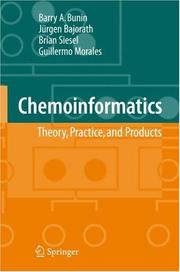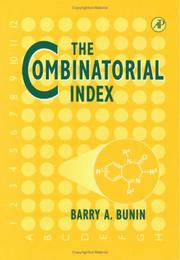| Listing 1 - 4 of 4 |
Sort by
|

ISBN: 1280724714 9786610724710 1402050011 1402050003 9048172500 Year: 2007 Publisher: Dordrecht : Springer,
Abstract | Keywords | Export | Availability | Bookmark
 Loading...
Loading...Choose an application
- Reference Manager
- EndNote
- RefWorks (Direct export to RefWorks)
Chemoinformatics: Theory, Practice & Products covers theory, commercially available packages and applications of Chemoinformatics. Chemoinformatics is broadly defined as the use of information technology to assist in the acquisition, analysis and management of data and information relating to chemical compounds and their properties. This ranges from molecular modelling, to reactions, to spectra, to structure-activity relationships associated with chemicals. Computational scientists, chemists, and biologists all rely on the rapidly evolving field of Chemoinformatics. Chemoinformatics: Theory, Practice & Products is an essential handbook for determining the right Chemoinformatics method or technology to use. There has been an explosion of new Chemoinformatics tools and techniques. Each technique has its own utility, scope, and limitations, as well as meeting resistance to use by experimentalists. The purpose of Chemoinformatics: Theory, Practice & Products is to provide computational scientists, medicinal chemists and biologists with unique practical information and the underlying theories relating to modern Chemoinformatics and related drug discovery informatics technologies. The book also provides a summary of currently available, state-of-the-art, commercial Chemoinformatics products, with a specific focus on databases, toolkits, and modelling technologies designed for drug discovery. It will be broadly useful as a reference text for experimentalists wishing to rapidly navigate the expanding field, as well as the more expert computational scientists wishing to stay up to date. It is primarily intended for applied researchers from the chemical and pharmaceutical industry, academic investigators, and graduate students.
Cheminformatics. --- Chemistry --- Data processing. --- Chemical informatics --- Chemiinformatics --- Chemoinformatics --- Chemistry informatics --- Information science --- Data processing --- Chemistry. --- Mathematics. --- Information theory. --- Biochemistry. --- Medicine. --- Bioinformatics. --- Computer Applications in Chemistry. --- Mathematics, general. --- Theory of Computation. --- Medicinal Chemistry. --- Molecular Medicine. --- Bio-informatics --- Biological informatics --- Biology --- Computational biology --- Systems biology --- Clinical sciences --- Medical profession --- Human biology --- Life sciences --- Medical sciences --- Pathology --- Physicians --- Biological chemistry --- Chemical composition of organisms --- Organisms --- Physiological chemistry --- Communication theory --- Communication --- Cybernetics --- Math --- Science --- Physical sciences --- Composition --- Health Workforce --- Chemoinformatics. --- Computers. --- Medicinal chemistry. --- Molecular biology. --- Molecular biochemistry --- Molecular biophysics --- Biochemistry --- Biophysics --- Biomolecules --- Chemistry, Medical and pharmaceutical --- Chemistry, Pharmaceutical --- Drug chemistry --- Drugs --- Medical chemistry --- Medicinal chemistry --- Pharmacochemistry --- Automatic computers --- Automatic data processors --- Computer hardware --- Computing machines (Computers) --- Electronic brains --- Electronic calculating-machines --- Electronic computers --- Hardware, Computer --- Computer systems --- Machine theory --- Calculators --- Cyberspace --- Computational chemistry

ISBN: 0121413403 9786611025861 1281025860 0080542409 9780121413408 9780080542409 9781281025869 Year: 1998 Publisher: San Diego Academic Press
Abstract | Keywords | Export | Availability | Bookmark
 Loading...
Loading...Choose an application
- Reference Manager
- EndNote
- RefWorks (Direct export to RefWorks)
With the explosion of combinatorial solid-phase methods, access to information has become one of the main barriers facing a synthetic chemist who is contemplating a combinatorial approach to a medicinal chemistry problem. The Combinatorial Index is an answer to that problem. This compendium of methods from the primary literature provides quick and convenient access to reliable synthetic transformations as well as information on linkers and analytical methods. Each synthetic procedure is preceded by a section entitled"Points of Interest, "which highlights the strengths and weaknesses of the various studies. The index also covers the use of solution-based synthesis for the generation of molecular diversity. Key Features * Organized for rapid retrieval of published information on classes of synthetic transformations, linkers, and analytical methods * Serves as a laboratory manual for bench chemists * Includes a chapter on linkers to assist in choice of linking strategy * Discusses strengths and limitations of the various methods * Contains a structural index showing functional group transformations in solid-phase synthesis.
Combinatorial chemistry --- Handbooks, manuals, etc. --- Pharmaceutical chemistry. --- Chemistry, Medical and pharmaceutical --- Chemistry, Pharmaceutical --- Drug chemistry --- Drugs --- Medical chemistry --- Medicinal chemistry --- Pharmacochemistry --- Chemistry --- Combinatorial organic synthesis --- Combinatorial synthesis (Organic chemistry) --- High-throughput organic synthesis --- High-throughput synthesis (Organic chemistry) --- Multiple parallel synthesis (Organic chemistry) --- Organic compounds --- Pharmaceutical chemistry --- Biochips --- Synthesis

ISBN: 9780121413408 0121413403 9780080542409 0080542409 1281025860 9781281025869 9786611025861 6611025863 Year: 1998 Publisher: San Diego Academic Press
Abstract | Keywords | Export | Availability | Bookmark
 Loading...
Loading...Choose an application
- Reference Manager
- EndNote
- RefWorks (Direct export to RefWorks)
With the explosion of combinatorial solid-phase methods, access to information has become one of the main barriers facing a synthetic chemist who is contemplating a combinatorial approach to a medicinal chemistry problem. The Combinatorial Index is an answer to that problem. This compendium of methods from the primary literature provides quick and convenient access to reliable synthetic transformations as well as information on linkers and analytical methods. Each synthetic procedure is preceded by a section entitled"Points of Interest, "which highlights the strengths and weaknesses of the various studies. The index also covers the use of solution-based synthesis for the generation of molecular diversity. Key Features * Organized for rapid retrieval of published information on classes of synthetic transformations, linkers, and analytical methods * Serves as a laboratory manual for bench chemists * Includes a chapter on linkers to assist in choice of linking strategy * Discusses strengths and limitations of the various methods * Contains a structural index showing functional group transformations in solid-phase synthesis.
Combinatorial chemistry --- Pharmaceutical chemistry. --- Handbooks, manuals, etc.

ISSN: 00766879 ISBN: 0121822729 9786611011390 1281011398 0080497101 9780121822729 Year: 2003 Volume: 369 Publisher: Boston ; Amsterdam : Elsevier Academic Press,
Abstract | Keywords | Export | Availability | Bookmark
 Loading...
Loading...Choose an application
- Reference Manager
- EndNote
- RefWorks (Direct export to RefWorks)
Combinatorial Chemistry encompasses both the design of compounds for specific pharmacological use and the screening of molecules in high throughput automated tests to find active agents with specific functions.*Analytical techniques*Direct sorting split and pool combinatorial synthesis*Linkers and their applications*Microwave assisted synthesis*Oligosaccharide chemistry*Peptide Synthesis and Screening*Polymer assisted approaches*Small molecule and heterocycle synthesis
Chemistry, Pharmaceutical. --- Combinatorial chemistry techniques. --- Combinatorial chemistry. --- Molecular biology. --- Molecular pharmacology. --- Combinatorial Chemistry Techniques --- Chemistry, Pharmaceutical --- Pharmacology --- Chemistry --- Technology, Pharmaceutical --- Investigative Techniques --- Analytical, Diagnostic and Therapeutic Techniques and Equipment --- Biological Science Disciplines --- Natural Science Disciplines --- Disciplines and Occupations --- Animal Biochemistry --- Human Anatomy & Physiology --- Health & Biological Sciences --- Natural Sciences --- Physical Sciences --- Discipline, Natural Science --- Disciplines, Natural Science --- Natural Science --- Natural Science Discipline --- Physical Science --- Science, Natural --- Science, Physical --- Sciences, Natural --- Sciences, Physical --- Biologic Sciences --- Biological Science --- Science, Biological --- Sciences, Biological --- Biological Sciences --- Life Sciences --- Biologic Science --- Biological Science Discipline --- Discipline, Biological Science --- Disciplines, Biological Science --- Life Science --- Science Discipline, Biological --- Science Disciplines, Biological --- Science, Biologic --- Science, Life --- Sciences, Biologic --- Sciences, Life --- Investigative Technics --- Investigative Technic --- Investigative Technique --- Technic, Investigative --- Technics, Investigative --- Technique, Investigative --- Techniques, Investigative --- Pharmaceutic Technology --- Pharmaceutical Technology --- Pharmacy Technology --- Technology, Pharmaceutic --- Technology, Pharmacy --- Drug Industry --- Pharmacologies --- Pharmaceutical Preparations --- Chemistry, Pharmaceutic --- Pharmaceutic Chemistry --- Pharmaceutical Chemistry --- Medicinal Chemistry --- Chemistry, Medicinal --- Chemistry Technic, Combinatorial --- Chemistry Technics, Combinatorial --- Chemistry Technique, Combinatorial --- Combinatorial Chemistry Technic --- Combinatorial Chemistry Technics --- Combinatorial Chemistry Technique --- Technic, Combinatorial Chemistry --- Technics, Combinatorial Chemistry --- Technique, Combinatorial Chemistry --- Chemistry Techniques, Combinatorial --- Techniques, Combinatorial Chemistry --- Gene Library --- Peptide Library --- Oligonucleotide Array Sequence Analysis --- High-Throughput Screening Assays --- Click Chemistry --- pharmacology --- Organic compounds --- Synthesis.
| Listing 1 - 4 of 4 |
Sort by
|

 Search
Search Feedback
Feedback About UniCat
About UniCat  Help
Help News
News